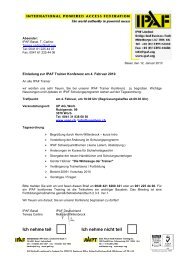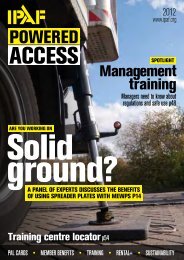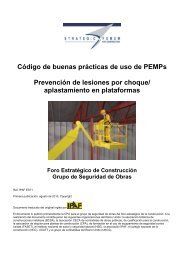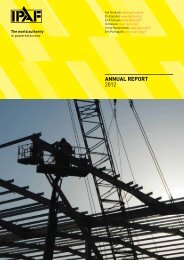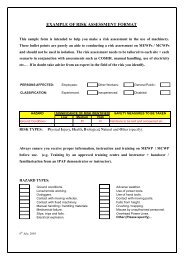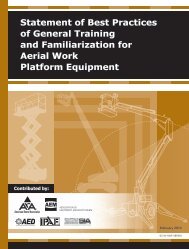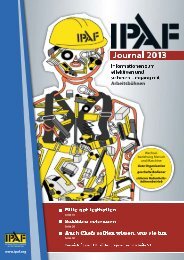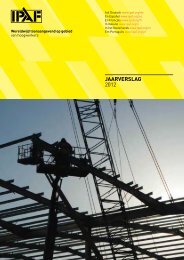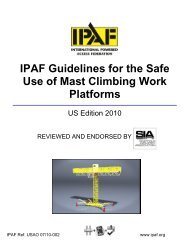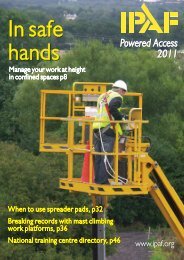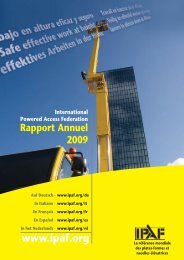Create successful ePaper yourself
Turn your PDF publications into a flip-book with our unique Google optimized e-Paper software.
PRESIDENT IN PROFILE<br />
View from<br />
the top<br />
Andrew Reid, the new president of <strong>IPAF</strong>, is<br />
one of the pioneers of powered access. Phil<br />
Bishop talks to him about the policy to get<br />
tough with rogues and corner-cutters in<br />
the industry.<br />
tion to detail was lost, accidents began<br />
to happen and mast climbers fell out of<br />
favour.<br />
Specialist offering<br />
Reid returned to the industry in 1996,<br />
establishing Mastclimbers as a specialist<br />
rental company. “When I started<br />
Mastclimbers it was a case of buying<br />
back kit that had been lying around in<br />
yards with nettles growing over it,“ he<br />
says. But with a good scrub and a lick of<br />
paint, it was as good as new.<br />
The first purchase was the fleet of<br />
Foulis, which had 70 machines. Three<br />
days later, while dismantling a mast<br />
climber that Foulis had erected in<br />
Glasgow, the platform collapsed. “That<br />
was my relaunch back into the mastclimbing<br />
industry,” says Reid. “During<br />
the investigations into that accident,<br />
I was informed by the HSE that they<br />
were within a whisker of banning them.<br />
There had been a couple of fatalities the<br />
year before with the EPL fleet. The use<br />
of the product was beginning to be an<br />
embarrassment because of the number<br />
of accidents,” he recalls.<br />
When Andrew Reid looks around the<br />
construction industry today he is “gobsmacked”,<br />
he says, “at the number of<br />
powered access products and the level<br />
of acceptance they now have”. This<br />
is because he can recall the days, 25<br />
years ago, when he would drive around<br />
construction sites with a boom lift or<br />
scissor lift on the back of a trailer trying<br />
to persuade people to try it. “I look back<br />
at how we had to knock down doors to<br />
get people to even look at the thing,” he<br />
says. “It was true pioneering stuff. We<br />
were literally forcing people to try it.”<br />
Over the past 30 years, Reid – now<br />
60 – has played a key role in getting<br />
firstly boom and scissor lifts, and then<br />
mast climbing work platforms, accepted<br />
in the UK. And he has worked in manufacturing,<br />
distribution and the rental<br />
side as well.<br />
Career move<br />
Reid’s first contact with the powered<br />
access industry was in 1975. He was<br />
working in marketing for Coles Cranes<br />
at the time. John L Grove had been<br />
squeezed out of the Grove Crane company<br />
that he had founded and so, having<br />
signed a non-compete agreement,<br />
established JLG Industries to produce<br />
powered access platforms.<br />
JLG approached Coles with a proposal<br />
for the latter to produce its platforms in<br />
the UK. The talks came to nothing, but<br />
they paved the way for a team from<br />
Coles to move to JLG in 1979 to set up a<br />
new factory in Cumbernauld. So it was<br />
that Reid returned to his native Scotland<br />
after eight years in London with Coles<br />
as sales and marketing director of JLG.<br />
In 1985 he left JLG to set up his own<br />
business, Anca Work Platforms, importing<br />
mast-climbing equipment made<br />
in Sweden by Malmqvist Svenska, in<br />
which he was also a major shareholder<br />
until its sale to HEK of Holland six years<br />
later.<br />
“Mast climbers were still an embryonic<br />
product”, he says, but Reid was<br />
sufficiently successful in persuading the<br />
industry that they represented the next<br />
revolution in access that he made sales<br />
to the major rental companies of the<br />
day, such as PTP, Scott Greenham and<br />
Hewden Stewart. “PTP built up a fleet of<br />
a couple of hundred units,” he recalls.<br />
In fact, Anca Work Platforms was<br />
sold to PTP in 1986, and eventually<br />
became the core of BET and Rentokil’s<br />
mast-climbing subsidiary.<br />
However, the image of mast climbers<br />
came to take a battering. They are<br />
a specialist piece of kit, but as rental<br />
companies changed hands, they began<br />
to be treated as commodity items. “The<br />
product lost its specialised support from<br />
people who knew how to handle them,<br />
and they got parcelled in with scissors<br />
and booms,” Reid explains. As atten-<br />
Raising standards<br />
This experience informs Reid’s close<br />
involvement with <strong>IPAF</strong> and the role<br />
he has played in the development of<br />
standards. He has chaired <strong>IPAF</strong>’s mastclimbers<br />
committee since its formation<br />
20 years ago, when it got together with<br />
the HSE to define the regime for this<br />
new product. “We have gone from a lack<br />
of definition, to a European harmonised<br />
design standard adopted by ISO and a<br />
British standard for safe use. That’s been<br />
achieved through <strong>IPAF</strong>,” he says.<br />
The standards agenda was given a<br />
major push after the Glasgow accident.<br />
“That accident led me to delve very<br />
deeply into all manner of legislation,” he<br />
says. Within five years, all the European<br />
and British standards had been re-written.<br />
“And – dangerous as it is to say – I<br />
am delighted that there hasn’t been an<br />
MCWP accident in the UK in the past<br />
three years,” he adds.<br />
Tough regulation<br />
With first-hand experience of how<br />
accidents, and the headlines that they<br />
generate, can impact on the perception<br />
of a product and the reputation of an<br />
industry, Reid is a firm believer in tough<br />
regulation to promote best practice and<br />
safety.<br />
“What happens in every industry,<br />
companies, people, individuals are basically<br />
out to make a buck. If they can cut<br />
a corner this way, cut a corner that way<br />
“There is nothing more sickening than seeing certain<br />
organisations disregard standards and put the whole<br />
industry at risk.”<br />
Andrew Reid<br />
16<br />
<strong>IPAF</strong> POWERED ACCESS REVIEW 2007



